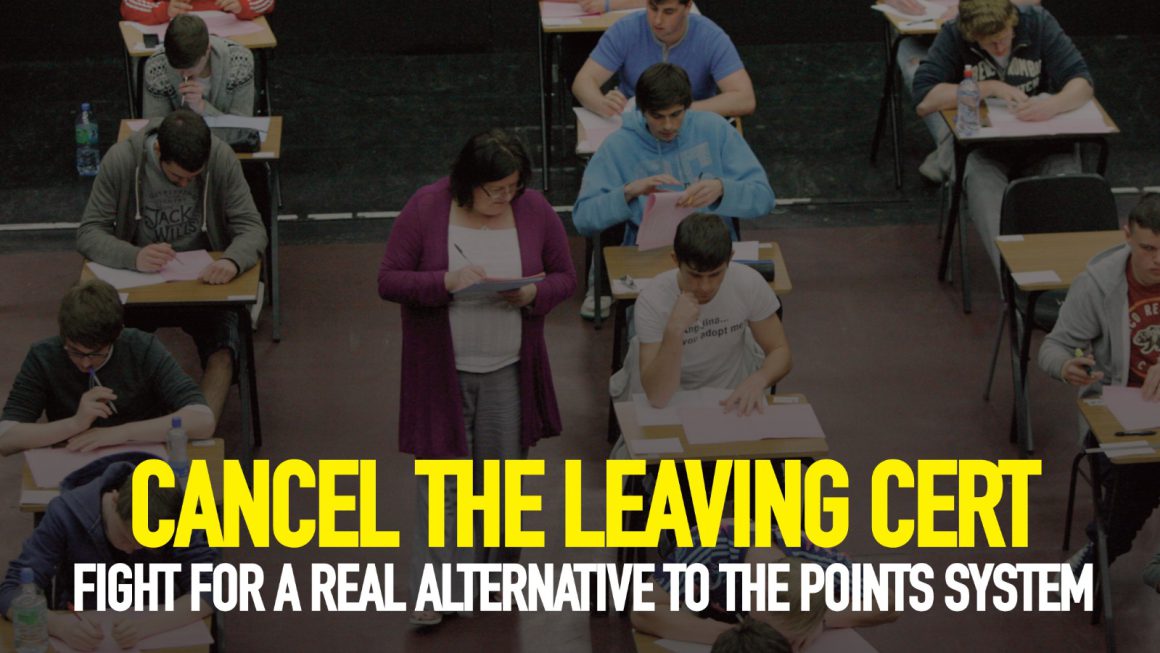By Keishia Taylor, Shane Finnan & Conor Tormey
In 2020, as the first few months of the Covid-19 pandemic raged, students campaigned using coordinated social media actions, petitions and huge online rallies, to cancel the Leaving Cert and won. Now in early 2021, student action has put the cancellation of the Leaving Cert on the agenda, pressured opposition parties to somewhat support students’ demands, and cornered the government into making a decision . With sustained coordinated action, we can fight not only to win cancellation of the traditional leaving cert this year, but point towards what kind of education system is needed.
Mick Barry, TD for Solidarity, and Socialist Party member, has become a renowned figure among Leaving Cert students after championing the students’ concerns in the Dáil and speaking multiple times on this issue. Mick Barry and young Socialist Party members facilitated an online rally streamed to 17,000 people across multiple platforms, and have hosted regular online student meetings, the largest of which had 500 in attendance, to assist students getting organised.
Out of these meetings, students agreed to launch social media storms targeting Minister for Education Norma Foley, and government party leaders, Micheal Martin, Leo Varadkar and Eamon Ryan, and as a result the hashtag #CancelTheLeavingCert2021 has trended several times. The brilliant student actions, as well as the reality of high Covid cases, has played an important role in pressuring the government to make concessions to students’ demands.
No COVID Leaving Cert
The treatment of students during the pandemic is just one example of the Irish Government’s detachment from the needs and experiences of ordinary people, and particularly young people. On all measures – the risk of infection in the classroom, the huge amount of school time missed, months of prolonged stress and anxiety, the accumulated inequalities of studying at home – conditions for students and teachers are arguably worse off this year compared to any other year.
One of the most obvious effects of Covid-19 on education is the severe disruption to teaching, with periods of school closures over the last two academic years, as well as self-isolation and illness of students and teachers. When students have been able to attend school, many have reported that physical distancing is impossible in overcrowded classrooms and it is too cold to concentrate as windows need to be kept open for ventilation.
Many of the inequalities at the core of the Leaving Cert have been catapulted into plain sight during the pandemic. Students from working-class and marginalised backgrounds face additional difficulties when trying to study at home. Students in digital poverty, without access to a laptop or broadband, and students living in overcrowded conditions without a quiet place to study are obviously disadvantaged. Home learning without the support of a school environment is also harder for people with mental health difficulties, disabilities, or special learning needs. Practically, it also means that coursework in languages or hand-based projects are impossible. No previous year has had to deal with the barriers that the year of 2021 is enduring now.
Worried sick
Anxiety and distress are widespread and worsening with the continuing uncertainty over whether the exams will go ahead and in what circumstances. Many students are rightly anxious about catching the virus themselves or spreading the virus to others, including vulnerable family members, and some are even suffering the bereavement of loved ones. The impact of prolonged isolation and background anxiety about the pandemic itself should not be underestimated.
Over the last few months, parents and doctors have reported a worrying increase in both anti-anxiety and antidepressant medication being prescribed to students due to the stress of the Leaving Cert. A 2019 survey conducted by revision website Studyclix reported that 75% of Leaving Cert students experienced “extreme stress” as a direct result of the exams, with 28% suffering from depression. State policy is cruel and detrimental to the mental well-being of young people!
Mental health problems are an epidemic and the government has not given the necessary funds to youth mental health facilities. In a normal year, one in two young people will develop mental health problems by the age of 24, with one in five experiencing suicidal ideation. Along with the pandemic restricting face to face appointments, this means youth mental health is at an all-time low. In the midst of a global pandemic and widespread mental health crisis, why compound the distress for the sake of these outdated exams?
The only solution to alleviate the mental distress and need for antidepressants would be to cancel the Leaving Cert and guarantee a place at third level so all those who wish to attend can do so. The government has a responsibility to safeguard students’ wellbeing and are instead defending an archaic institution. The government needs to be forced to back down from their hazardous and reckless Leaving Cert policy.
Perpetuating inequality
When students sit their Leaving Cert, most feel that these are life-defining exams. The whole education system promotes the Leaving Cert as the definitive finale of second-level education, putting unnecessary pressure on young people as the results determine whether students can access higher education. The Leaving Cert is seen as allowing students to continue with their education, but in reality, it is a barrier dividing students and refusing some opportunities for higher education.
While students from more affluent backgrounds can pay for grinds, students from working-class or underprivileged backgrounds simply do not have the same opportunities. Working parents, single parents, or parents who must focus on making ends meet may not be able to offer as much assistance with studying at home. Students from immigrant backgrounds whose parents did not experience the Irish education system or may not speak English are also at a disadvantage. Resources such as money and a quiet study space at home really do make a difference in both preparing and performing for the Leaving Cert exams. Middle-class students are often better equipped than their working-class counterparts. Students may also choose their Leaving Cert subjects based on how to maximise their total points, rather than pursue their interests, picking subjects that are seen as easier to do well in.
The government recently discussed the possibility of vaccinating Leaving Cert students early so they can sit the exams. Obviously, everyone should have access to vaccinations, but the government’s motivation for bumping Leaving Cert students up the list would have been to keep the traditional system in place and relinquish responsibility for finding an alternative. Cancelling the exams this year, on top of the changes to the process last year, would be a serious blow to this institution and indicate that change is possible – something the government would like to avoid. The political establishment benefits from maintaining class division and elitist ideas.
Predictive grades not enough
One possible alternative to written exams is predicted or calculated grades, which were used last year. But what will these calculations be based on? The amount of class time missed, the drastically changed mode of teaching and huge variation between schools means that calculating grades fairly would be impossible. Calculated grades would be based on averaging previous test or homework scores, which would place students who have long term pressures, other responsibilities or part-time jobs at a disadvantage, as they would not be able to cram for exams. An alternative would be to base the grades on a mock exam, which would make the mocks as pressurised as the real Leaving Cert itself!
The previous grades achieved in each school are incorporated in a predicted grades system, meaning that the inequalities between fee-paying and DEIS schools are explicitly reproduced in the results given to students. Last year, the government hired a private company to oversee the grades, which were found to have negatively affected 6100 students’ results. Even in the UK, where predicted A levels have been used for many years, a 2016 study found that only 16% of applicants achieved the A-level grade points that they were predicted.
Predictive grades would not resolve anxiety and uncertainty felt by many students, and the only solution that serves students is the cancellation of the exams, allowing students to graduate and guaranteeing a place in Third Level to every Sixth Year student who wishes to attend, along with investment in apprenticeships and training.
Many teachers are understandably opposed to a predictive grades system, as it transforms teachers from advocates and mentors into judges. Teachers do not want the power to decide whether their students get into college. And making them play this role could also be a source of conflict with parents who are dissatisfied with the grade results, particularly in tightly-knit rural communities or where parents have extremely high expectations for their children. Teachers and students should not be pitted against each other. Cancelling the Leaving Cert entirely and allowing all students to progress to their choice of further and higher education is the only solution in the best interests of both students and teachers. We are calling on the teachers’ unions ASTI and TUI to come out firmly in support of their students, their members and the programme outlined in this article – cancel the Leaving Cert and open access to Third Level.
Universal third level education
The question that gets to the heart of the Leaving Cert campaign is why students must take exams to get into college in the first place. Education is a right, not a commodity. It should be free and accessible for all who want it irrespective of class background or family advantages. The idea that only certain people deserve higher education and that the deserving ones can be identified by an exam riddled with class bias are extremely archaic and reproduce inequalities through the generations.
Secondary, and even primary, education was not always the norm and when secondary school was extended to the general population, working class people benefited. Why would third level education be any different? A massively expanded third level education system with more places, free access, and better student financial support to help students with rent, living costs, special education needs, childcare and any other support they might need.
This would also require the hiring of more staff. Huge numbers of education workers and tutors are currently unemployed, under-employed or precariously employed, and should be offered secure, full-time and well-paid contracts, to reduce the number of students per class and increase the time teachers can dedicate to each student.
This alternative to stressful exams might be criticised for being expensive. But the government budgeted €95 million for the greyhound and horse racing industries (which should never be subsidised by the tax-payer to begin with) and spent tens of millions in legal fees to avoid receiving €14 billion in taxes from Apple. Paying hefty subsidies to multinational corporations, giving generous tax breaks and keeping corporate tax low is business as usual for the Irish state. Ireland has the highest per capita rates of the super-rich globally, with 3,000 new millionaires in 2018 and 17 billionaires in 2020. The resources to establish a universal third level education system already exist but are hoarded by elites instead of being put to work for the benefit of the majority. The obscene wealth that exists in society should be invested in public services, including universal third-level education for all who want it, without the need for gruelling exams.
In Ireland, the Catholic Church has had a stranglehold on education since the beginning of the state and was responsible for decades of institutional abuse. Having a religious school system means discrimination against all other religious backgrounds and those with no religion at all. To this day, the Church strongly influences the curriculum and particularly how sex education is taught – in a way that discriminates against LGBTQ people, and promotes backward and moralistic attitudes to sex. Any overhaul of the education system should have the separation of Church and state at its foundation.
A capitalist curriculum
Education is a right and has countless benefits for people to develop skills and explore ideas. But alongside the many benefits, education is also an arena in which the establishment can propagate their ideas. Education in the capitalist system promotes following instructions, and focusing on ranking, grades and scores. The capitalist ideals of productivity and competition are instilled as the main source of a person’s value.
The Leaving Cert exams and points system exemplify this. Students spend years preparing for a set of exams that require learning by rote and regurgitating information in pursuit of a single number that will determine access to third level education. This narrow and superficial approach is a wildly inaccurate measure of intelligence, potential, and even aptitude for particular third level courses or occupations. Far from fostering curiosity and enthusiasm, this system of education actually represses exploration, turns understanding into memorising, and promotes “teaching to the test”.
Education in a capitalist system seeks to entrench bias by neglecting the history of marginalised people; Traveller history is completely missing, for example. The role of women, LGBTQ people and people of colour in historical events and fighting for their own liberation is understated, and in fact, working class people are not presented as active agents at all. Education in a capitalist system promotes a “Great Man” theory of history that focuses on leaders and wealthy individuals as the drivers of history instead of the collective struggles of working-class people. Even revolutionaries, trade unionists and activists are turned into heroic individuals, rather than part of the powerful movements that are the real forces creating change. The dominant assumption is that capitalism is the only viable way to organise society, and radical ideas are neutralised or channelled towards dead ends. Without access to working class history, ideas that support the capitalist system are difficult to combat.
When education is controlled by the political establishment, they will influence the syllabus, the way it is taught, and the relationships between education and employers, to maintain a system that prioritises profit and the defence of the profit-system above all else. It will therefore not be possible to implement the far-reaching changes needed until the power is taken out of their hands. The education system should instead be organised by education workers (primary and secondary teachers, special needs assistants, lecturers, researchers, support staff), with the involvement of parents and students, who have the experience, knowledge and understanding to run schools and colleges for the benefit of society.
In a capitalist system, third level education can be a commodity – something to be bought and profited from. Third level institutions are run as businesses, who extort increasingly unreasonable fees from students and their families, putting many into long-term debt, or blocking many working-class students from attending. Similarly, education workers face increasingly precarious conditions, with declining pay, higher workloads, and an erosion of pensions and other benefits that previous generations would have taken for granted.
The purpose of education under capitalism is to prepare us for the workplace and provide the type of education that allows us to perform the types of jobs needed by the system. But at the same time, it can provide skills and opportunities that we can use to change society and further the interests of the majority, instead of the status quo.
Fight for an alternative
The education system should facilitate people to develop new skills, explore ideas and pursue their talents, as well as literacy, numeracy, and critical thinking. School is an important time for developing maturity and life skills such as cooking, exercising and driving a car. A more rounded education would nurture curiosity, creativity, expression, and enthusiasm that could help people thrive and contribute to innovation, as well as establishing approaches for lifelong learning. Education can empower us to fight for justice and equality, and challenge the capitalist system that exploits and oppresses us..
Cancelling the Leaving Cert this year could deal a real blow to the cruel and outdated points system and open the door to widespread education reforms if students continue to organise. The campaigns against the Leaving Cert this year and last year, as well as the widespread protests against climate change, racism and macho culture in recent years, have demonstrated that young people will fight for change and will be central for pointing the way forward for a transformation of society in the interests of young and working-class people.
We stand for:
- Immediate cancellation of the Leaving Cert – sixth year students should be issued with a graduation certificate and continue to third level if they wish
- No school reopening before it is safe to do so, and social distancing and other protective health measures firmly in place. Delivery of vaccinations to staff and students in a timely way.
- Free and accessible education for all from pre-primary to third level and advanced degrees
- A democratically controlled education system by committees of education workers, with input from parents and students
- Democratic planning to provide for the education that young people want and to train and retain for jobs and skills that are needed and useful for society
- A quality education system based on the development of curiosity, critical thinking, creativity, skills, initiative and enthusiasm
- A massive increase in secure, well-paid jobs in the education sector
- Full separation of Church and State, and secular, consent-based, LGBTQ-inclusive sex education












